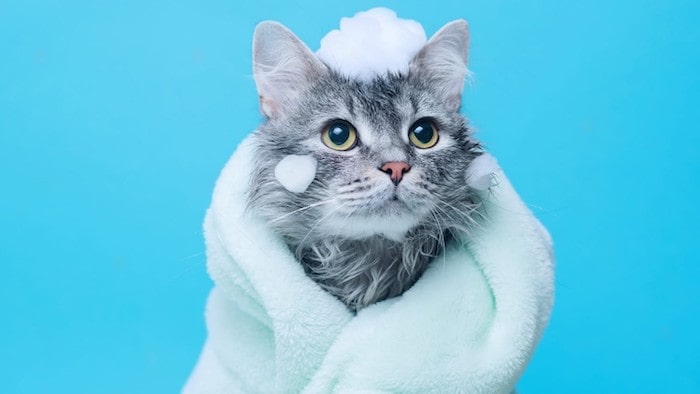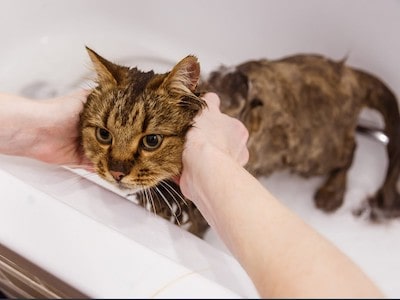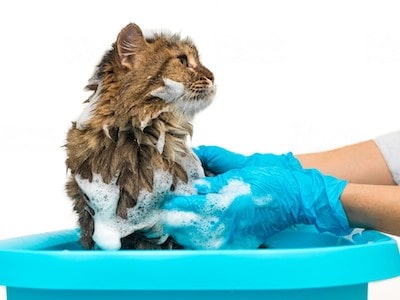Cats are truly special creatures that bring us joy and comfort. From their cuddly purrs to their playful antics, these furry friends can really brighten up our lives! But when it comes to taking care of their skin and fur, the process can be delicate.
According to RSPCA, ”Never use human shampoo on cats as they are unsuitable for cat hair and may dry out their skin.”
We all want our cats to be healthy and comfortable in every way possible; however, using a human shampoo on them could have serious consequences. That’s why it is important for us as pet owners to learn more about cat grooming so we can take proper care of them!

In this blog article, we will explore the world of cat grooming and discuss what makes certain shampoos better or worse for your feline companion.
We will also lay out some tips on how you should properly groom your cat’s skin and fur, from choosing the right shampoo all the way down to brushing technique.
So that you make sure they stay safe during this process! So join us as we dive deep into understanding how best look after our beloved cats’ health through proper grooming practices today!
Contents
What is in human shampoo that is harmful to cats?
When it comes to grooming, choosing the right shampoo for your cat is crucial. Human shampoo is formulated for the pH levels and skin types of humans, which are different from those of cats.
This means that using human shampoo on your cat can be harsh and irritating to their skin, causing dryness, itching, and even hair loss.

One of the key differences between human and cat shampoo is the presence of fragrances and essential oils. While these ingredients can leave us smelling fresh and clean, they can be toxic to cats if they are licked or ingested.
Additionally, some human shampoos contain sulfates and other harsh detergents that can strip the natural oils from a cat’s skin and fur, leaving them dry and itchy.
What are some of the symptoms of using human shampoo on cats?
If your cat has been exposed to human shampoo, it is essential that you act quickly. Symptoms such as skin irritation, redness, itching and hair loss can be painful and uncomfortable for your beloved pet, not to mention potentially life-threatening if an allergic reaction occurs.
In this case, hives may form on the skin along with swelling and difficulty breathing. Left untreated, these reactions could lead to secondary infections or other serious issues.

To help protect your feline friend from further distress, it is important that they are rinsed off thoroughly before seeking the advice of a veterinarian who can diagnose the problem correctly and provide appropriate treatment options that will relieve symptoms as well as prevent any future complications from arising due to exposure of human shampoo products!
How often should I bathe my cat?
”Cats should be given a bath once every 4-6 weeks, depending on how often they groom themselves, and the environment they’re usually in’‘, Says Purnia. While some cats may enjoy the occasional bath, over-bathing can strip the natural oils from their skin and fur, leading to dryness and irritation. The frequency of bathing your cat depends on several factors, including their coat type, lifestyle, and overall health.

Alexander Pytskiy – iStock
For most cats, bathing once a month is sufficient. However, if your cat spends a lot of time outdoors, has a long coat, or has skin conditions, they may need to be bathed more often. On the other hand, if your cat has a short coat, spends most of their time indoors, and is healthy, they may only need a bath a few times a year.
FAQs
What is the difference between human shampoo and cat shampoo?
Human shampoo is formulated for the pH levels and skin types of humans, while cat shampoo is specifically designed for the pH levels and skin types of cats. Using human shampoo on a cat can cause skin irritation and other health problems.
Can human shampoo be toxic to cats?
Yes, human shampoo can be toxic to cats if they are licked or ingested. Some human shampoos contain fragrances and essential oils that are toxic to cats, and others contain harsh detergents that can strip the natural oils from their skin and fur.
What are the symptoms of using human shampoo on a cat?
If a cat is exposed to human shampoo, they may experience symptoms such as skin irritation, redness, itching, hair loss, hives, swelling, and difficulty breathing. In severe cases, the shampoo may cause an allergic reaction.
How often should I bathe my cat?
The frequency of bathing a cat depends on several factors, including their coat type, lifestyle, and overall health. For most cats, bathing once a month is sufficient.
Go checkout the same article, Can I Use Human Shampoo On Cat? from WeNeedPets.
Well, It’s a Wrap
To ensure your cat’s wellbeing, it is vital to select a shampoo designed specifically for cats and their delicate skin and pH levels. Furthermore, bathing should only be done when necessary. If you have any doubts about the grooming routine of your pet, consulting with a veterinarian is highly recommended.
Taking these precautions can help keep your feline friend healthy and happy in the long run. Ultimately, using human shampoo on cats can lead to severe skin irritation as well as other health complications; therefore it should be avoided at all costs.
Charlene Pare is the founder of Cat Likes Best. She manages and strategizes the content published on this website. When she isn’t working, she enjoys exploring the city around with her Ameican Shorthair kitty–Moli. Being a technocrat and an avid cat lover, she also writes on pet tech products and some of the featured articles.





